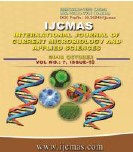


 National Academy of Agricultural Sciences (NAAS)
National Academy of Agricultural Sciences (NAAS)

|
PRINT ISSN : 2319-7692
Online ISSN : 2319-7706 Issues : 12 per year Publisher : Excellent Publishers Email : editorijcmas@gmail.com / submit@ijcmas.com Editor-in-chief: Dr.M.Prakash Index Copernicus ICV 2018: 95.39 NAAS RATING 2020: 5.38 |
A case study was conducted on evaluation of MIS and traditional irrigation methods on the farmer’s prospective with an aim to develop understanding about potential benefits of drip irrigation system among farming community of the Kodinar and near Taluka of Gujarat. Comparative assessment in terms of yield gain, water productivity and net returns was carried out for wheat, bajra, groundnut, sugarcane, cotton and mango. About 70 farmers field who were using drip irrigation for more than 3 consecutive years from 2013 covering an area of around 210 hectare was taken for the study. The study revealed that, for the selected crop which adopted drip irrigation improved the yields in the range of 14.59 to 81.9 % over traditional irrigation with highest yield increase in case of mango (81.9%) and wheat (14.59%). Drip irrigation consistently recorded higher water productivity (WP) with more than five folds increase in case of mango. The average WP was higher under drip irrigation (5.43 kg m-3) as compared to traditional method (0.94 kg m-3). Economic analysis revealed that the average benefit-cost (CB) ratio of all drip irrigated crops was about 3.113. Among all the crops drip irrigated Sugarcane was found to be the most remunerative crop with higher net returns (2,44,220 Rs/ha) and highest BC ratio of 4.83.
 |
 |
 |
 |
 |